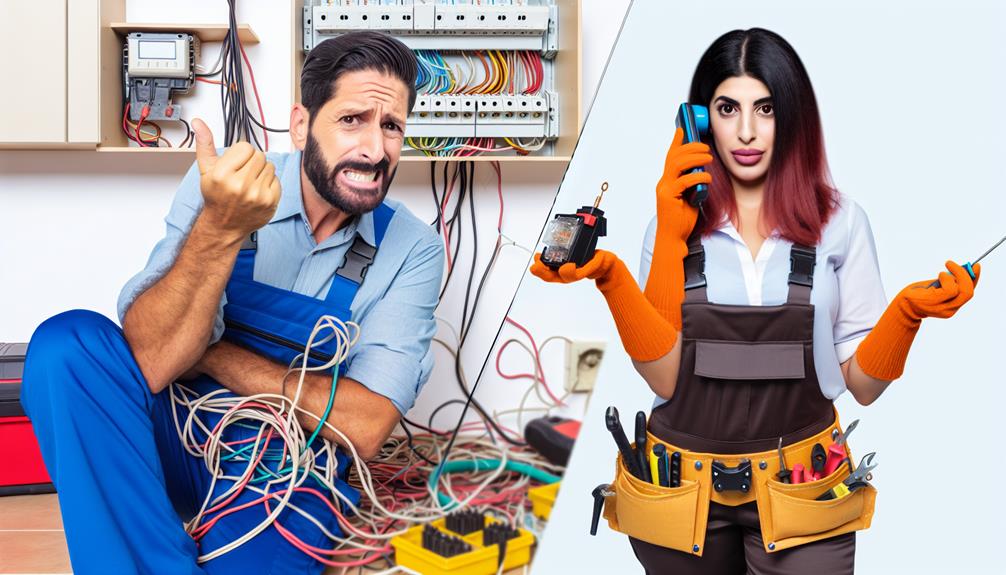DIY Vs. Professional Electrical Services: When to Call the Experts
Have you ever wondered if you could handle electrical repairs and installations on your own, or if it’s better to call in the professionals? It’s a question that many homeowners face when confronted with electrical issues or home improvement projects.
While the idea of saving money and taking pride in a DIY project might be tempting, there are certain situations where it’s crucial to recognize the limits of your skills and expertise.
So, how do you determine when to roll up your sleeves and when to pick up the phone? Let’s explore the factors that can help you make an informed decision and ensure the safety and success of your electrical endeavors.
Key Takeaways
- DIY electrical work comes with potential dangers and limitations, including the risk of electrical shock or fire hazards.
- It is important to have a basic understanding of electrical systems, codes, and safety procedures before attempting DIY electrical projects.
- Assess the complexity of the project and your level of expertise before deciding to tackle it yourself. Seek professional help if unsure or uncomfortable with any aspect.
- Safety, compliance with regulations, and cost considerations should be taken into account when deciding between DIY and professional electrical services.
Understanding the Risks and Benefits
Understanding the risks and benefits of DIY electrical work versus hiring professional services is crucial before embarking on any electrical project. While DIY electrical work may seem appealing for its potential cost savings and sense of accomplishment, it’s important to be aware of the potential dangers and limitations involved.
One of the main risks of DIY electrical work is the potential for electrical shock or fire hazards. Working with electricity without proper knowledge and experience can lead to serious injuries or property damage. Professional electricians undergo extensive training and have the necessary skills to ensure safe and compliant electrical installations.
Another consideration is the quality of workmanship. DIY projects may lack the precision and expertise of professional installations. Faulty wiring or improperly installed electrical components can result in malfunctions, power outages, or even electrical fires. Professional electricians have the expertise to design and install electrical systems that meet safety codes and regulations.
Additionally, there are certain electrical tasks that should only be handled by licensed professionals. These include complex installations, repairs involving the main electrical panel, or work in hazardous environments. Attempting these tasks without the proper qualifications can’t only be dangerous but may also violate legal requirements.
While DIY electrical work can be empowering and cost-effective for simple tasks, it’s important to recognize the risks and limitations. Hiring professional electrical services ensures safety, compliance, and the peace of mind that comes with expert workmanship.
Evaluating Your Skill and Experience
Before you proceed with any electrical project, it’s crucial to assess your own skill and experience in order to determine whether DIY electrical work is a suitable option for you. Evaluating your skill and experience will help you make an informed decision and ensure your safety and the safety of others. Here are some key factors to consider:
- Knowledge: Do you have a basic understanding of electrical systems, codes, and safety procedures? It’s important to have a solid foundation of knowledge before attempting any electrical work.
- Experience: Have you successfully completed similar electrical projects in the past? Experience can be a good indicator of your ability to handle more complex tasks.
- Tools and equipment: Do you have the necessary tools and equipment to safely and effectively complete the project? Using the wrong tools or equipment can lead to accidents and damage.
Assessing your skill and experience will help you determine whether you have the necessary expertise to tackle the electrical project on your own. Remember, if you’re unsure or uncomfortable with any aspect of the project, it’s always best to seek the help of a professional electrician.
Assessing the Complexity of the Project
Assess the complexity of the project to determine whether it requires the expertise of a professional electrician or if it’s within your capabilities to tackle it yourself.
When evaluating the complexity of an electrical project, consider factors such as the size of the project, the level of expertise required, and the potential risks involved.
First, consider the size of the project. Is it a simple task, such as replacing a light switch or installing a new outlet? Or is it a more complex project, such as rewiring an entire room or installing a new electrical panel? Larger projects often require a deeper understanding of electrical systems and may involve working with higher voltages, which can be dangerous without proper knowledge and experience.
Next, assess the level of expertise required. Are you familiar with electrical codes and regulations? Do you have experience working with electrical wiring and components? Some projects, such as troubleshooting electrical issues or installing complex lighting systems, may require specialized knowledge and skills that only a professional electrician possesses.
Lastly, consider the potential risks involved. Electrical work can be hazardous if not done correctly. Working with live wires, improper grounding, or faulty installations can lead to electrical shocks, fires, or even fatal accidents. If the project involves working with high-voltage systems or requires working in tight spaces, it’s advisable to seek the assistance of a professional electrician who’s trained to handle such situations safely.
Considering Safety and Compliance
To ensure the safety and compliance of your electrical project, it’s crucial to understand the importance of following proper guidelines and regulations. Electrical work can be hazardous if not done correctly, and failure to comply with codes and standards can lead to serious consequences, including injury, property damage, or even legal issues.
Here are three key reasons why safety and compliance should be a priority:
- Personal Safety:
- Electrical work involves handling live wires and working with high voltages, which can be dangerous if proper precautions aren’t taken.
- Following safety guidelines ensures that you protect yourself from electrical shocks, burns, or other accidents that can result from mishandling of electrical components.
- Professionals are trained on safety procedures and have the necessary equipment to minimize risks.
- Property Protection:
- Incorrect electrical installations can lead to electrical fires, damaging your property and belongings.
- Compliance with regulations ensures that electrical systems are installed properly and meet safety standards, reducing the risk of fire hazards.
- Professionals have the knowledge and experience to perform installations that are safe and reliable.
- Legal Compliance:
- Electrical work is subject to local building codes and regulations, which vary from jurisdiction to jurisdiction.
- By hiring a licensed electrician, you can ensure that your project meets all the necessary requirements and passes inspections.
- Non-compliance can result in fines, penalties, or even the need to redo the work to meet code.
Weighing the Cost and Time Investment
Considering the financial and temporal aspects of your electrical project is essential when deciding between DIY and professional services.
While doing the project yourself may seem like a cost-effective option, it’s important to weigh the potential risks and expenses involved. DIY projects often require you to purchase tools, equipment, and materials, which can quickly add up. Additionally, if you make a mistake during the installation or repair process, it can lead to costly damages or even pose a safety hazard.
On the other hand, hiring a professional electrical service may require a higher upfront investment, but it can save you time and money in the long run. Professionals have the necessary skills, experience, and knowledge to efficiently complete the project, ensuring it’s done correctly and up to code. They also have access to specialized tools and equipment, which can prevent any potential damage or accidents.







